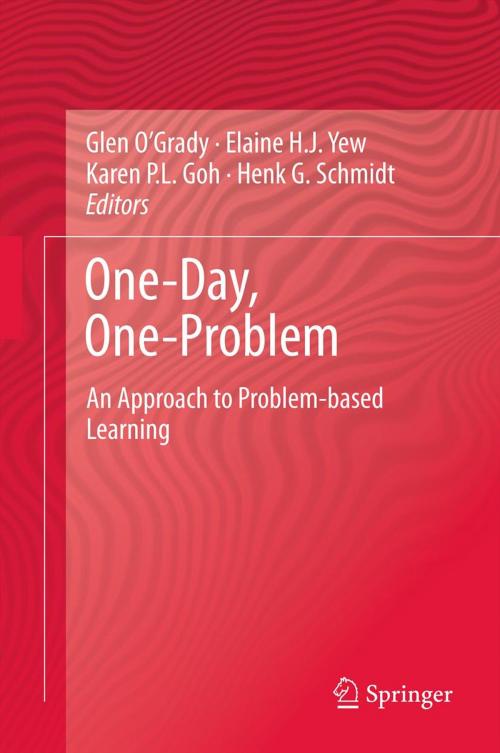One-Day, One-Problem
An Approach to Problem-based Learning
Nonfiction, Reference & Language, Education & Teaching, Educational Theory, Educational Psychology, Teaching, Teaching Methods| Author: | ISBN: | 9789814021753 | |
| Publisher: | Springer Singapore | Publication: | April 12, 2012 |
| Imprint: | Springer | Language: | English |
| Author: | |
| ISBN: | 9789814021753 |
| Publisher: | Springer Singapore |
| Publication: | April 12, 2012 |
| Imprint: | Springer |
| Language: | English |
One-day, one-problem is a unique adaptation of problem-based learning (PBL) pioneered at Republic Polytechnic, Singapore. Here students are challenged each day with a problem from their domain and attain the necessary learning outcomes in the process of responding to the problem. Throughout the day students would engage in small group discussions, self-directed learning and conversations with their teacher who plays the role of a facilitator. This approach to learning and instruction represents a new brand of constructivist learning in a more structured learning environment compared to conventional PBL. This book contains a series of chapters by authors with first-hand experience in the One-day,one-problem PBL approach. Unlike other books on PBL, the chapters are both research-informed and practical. Results of empirical studies into the factors of PBL such as quality of problems, tutor behaviours, scaffoldings, student learning and interest are discussed together with practical implications for the educator.
The book begins with an overview of the one-day, one-problem process, providing a viewpoint from both the student and tutor. Republic Polytechnic’s pedagogical philosophy and epistemological belief of education are introduced with the intent to share how the polytechnic designed and implemented a system that supports the philosophical beliefs. Results and practical implications of empirical studies on the various factors that influence students’ learning in PBL are discussed. These include the quality of problems and the use of scaffoldings for students’ learning, tutors as facilitators, preparation of staff for PBL, student assessment, how students learn in the process of PBL and student interest.
One-day, one-problem is a unique adaptation of problem-based learning (PBL) pioneered at Republic Polytechnic, Singapore. Here students are challenged each day with a problem from their domain and attain the necessary learning outcomes in the process of responding to the problem. Throughout the day students would engage in small group discussions, self-directed learning and conversations with their teacher who plays the role of a facilitator. This approach to learning and instruction represents a new brand of constructivist learning in a more structured learning environment compared to conventional PBL. This book contains a series of chapters by authors with first-hand experience in the One-day,one-problem PBL approach. Unlike other books on PBL, the chapters are both research-informed and practical. Results of empirical studies into the factors of PBL such as quality of problems, tutor behaviours, scaffoldings, student learning and interest are discussed together with practical implications for the educator.
The book begins with an overview of the one-day, one-problem process, providing a viewpoint from both the student and tutor. Republic Polytechnic’s pedagogical philosophy and epistemological belief of education are introduced with the intent to share how the polytechnic designed and implemented a system that supports the philosophical beliefs. Results and practical implications of empirical studies on the various factors that influence students’ learning in PBL are discussed. These include the quality of problems and the use of scaffoldings for students’ learning, tutors as facilitators, preparation of staff for PBL, student assessment, how students learn in the process of PBL and student interest.















